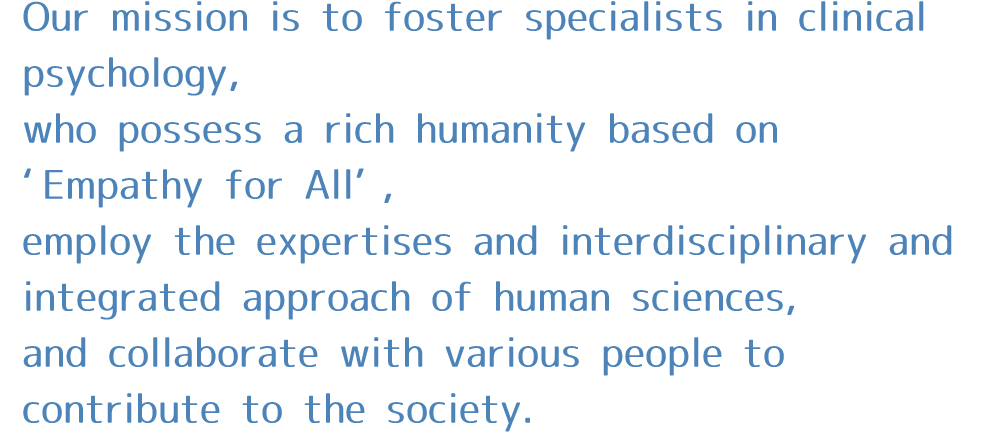
Our Education and Research
In the Clinical Psychology Major, we strive to educate students to become competent Certified Public Psychologists and Clinical Psychologists. We believe that to become a good clinician, it is essential for students to: (1) acquire a solid knowledge of basicpsychology and clinical psychology; (2) cultivate a scientific and theoretical way of thinking through research and become able to objectively assess things; and (3) refine their clinical awareness in clinical settings and learn in practice. In this major, we offer a wide range of courses that are essential and sufficient to fulfill these requirements, and we focus on practical training and research supervision.
Curriculum
In the Clinical Psychology Major, we have faculty members with rich experience in clinical settings as well as a proven track record as researchers, and they are well-balanced with a wide range of fields. We aim to nurture professionals who are ready to work immediately with a high level of research skills as well as practical skills through extensive practical training and supervision, while also focusing on basic psychology and research supervision. Research supervision begins in the spring of the first year. Seminars are conducted in small groups of no more than two students per lecturer. The graduate students design and plan their own research with the guidance of their academic advisors, but they can also receive advice from other faculty members as desired. We support the research activities of graduate students throughout the entire program.
We have started offering a curriculum for training Certified Public Psychologists since FY2018, and students can obtain the qualifications to take the examinations for both Certified Public Psychologists and Clinical Psychologists if they complete the required courses.
Requirements for Completion
To complete the program, students must be enrolled in the graduate school for two years and earn at least 43 credits, including 25 compulsory credits. In addition, students are required to submit a master’s thesis after receiving research supervision and be approved by the board of review.
Degree and Other Qualifications
Students who complete the master’sprogram in clinical psychology will be awarded a Master of Arts (Psychology). In addition, as we are a Certified Graduate School of Clinical Psychology (Type 1), the graduates will be eligible to take the examination forClinical Psychologist, which is certified by the Foundation of the Japanese Certification Board for Clinical Psychologists,in the year of completion of the program. The graduates will also be eligible to take the examination for Certified Public Psychologists by completing the required courses, as our curriculum is compatible with the national qualification for the training of Certified Public Psychologists since FY2018 (given that the studentshave completed the required courses at the undergraduate level).
Our graduates pass the examinations for both Certified Public Psychologists and Clinical Psychologists at a higher rate than the national average every year.
